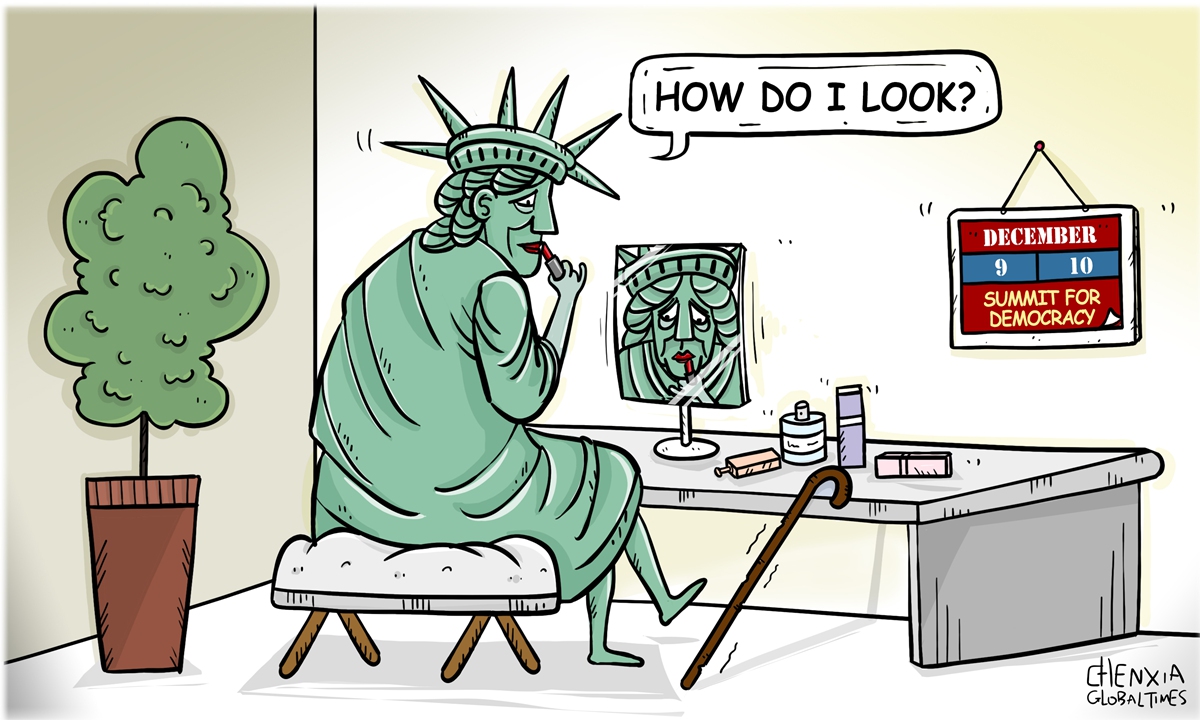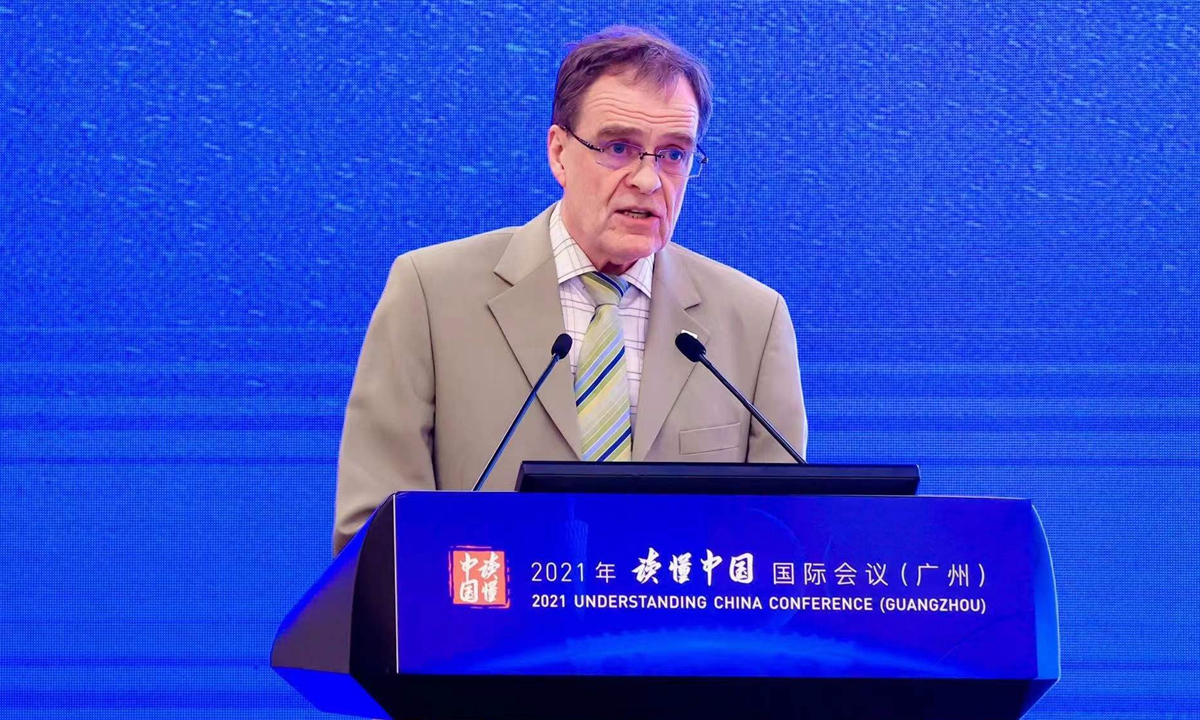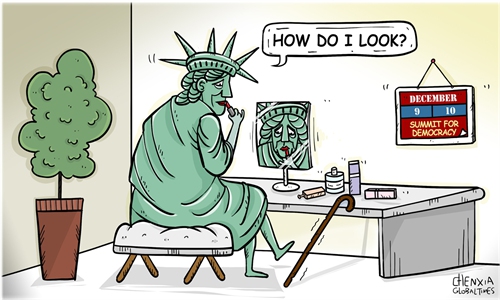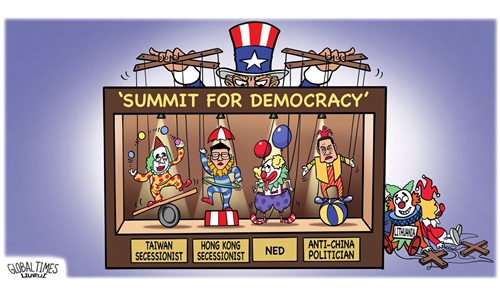
Illustration: Chen Xia/GT
Editor's Note:
Having worked in China for 15 years, David Ferguson, a foreign expert from Foreign Languages Press - part of China International Communications Group - and winner of the Chinese Government Friendship Award for promoting cultural exchanges between China and other countries, has participated in the preparation of many Chinese white papers on subjects such as democracy and Xinjiang. He considers that this provides him with an important channel to understand China's development. David believes China should speak louder to the world about its political system and explain why it works, to offset the biased and false impression portrayed by some Western media. In an exclusive interview with Global Times (GT) reporter Cao Siqi and Xing Xiaojing, David shares his understanding of China's democracy and why it works well. He takes the view that there is no prospect for democracy in the US as the system is designed for the wrong people to flourish.
GT: Having been working and living in China for 15 years, what is your impression of China's democracy? When it comes to talking about China's democracy, what are the misunderstandings or misinterpretations in the US?
David: The whole point of China's democracy is that it involves people in a much more active way than a Western style democracy. China's democracy is about consultation, cooperation and consensus. People are invited to be actively involved in the process of creating legislation, which is one of the fundamental purposes of governance. In China, democracy is a way of involving people actively and on an ongoing basis, whereas in the West, people participate in direct elections and there isn't much opportunity to get involved apart from that.
The biggest misunderstanding or misinterpretation of China's democracy in the West is that they believe there is only one model. If you don't have "one person, one vote," then you don't have democracy. There's a tremendous amount of ignorance in the West about China's system and very few people understand that in China you have direct elections up to county and city level which function in a very similar way to Western models.
Any Chinese citizen over the age of 18 except persons deprived of political rights by law can stand for election and a person doesn't have to be a member of the Communist Party of China.
However, most people in the West have no idea about any of that.
This ignorance means they have no idea about grassroots democratic elections and how these things happen. They don't trouble themselves to try to find out because they're too busy criticizing China and too busy working from a position of intellectual and moral superiority to ever bother to find out what really happens in China.
China's democracy is a good model because the people that electorates vote for are people who are going to be directly involved in doing things that make a difference to their daily life. The indirect election structure in China is a more sensible approach to higher level elections and I don't think direct election is particularly effective.
Many Chinese people think the West has misunderstandings of China in terms of Xinjiang, Hong Kong, or Taiwan-related affairs. But it is not misunderstanding. It is deliberate misrepresentation. If you think it's a misunderstanding, you can correct it using facts. But it is anger, fear and emotional hostility. You can't address this Sinophobia by using logic and reason.
GT: Biden's summit for democracy has sparked controversy. Many analysts say that what the American people need the most right now is not a summit on democracy, but a resolution of their domestic problems. How do you see the democracy summit? How do you think democracy should be defined?
David: The only reason for the summit is troublemaking. The summit doesn't serve any other purpose than troublemaking ahead of the 2022 Beijing Winter Olympics. It's just an excuse for some people to get together and repeat a whole set of arguments about why China is not good.
The US defines democracy as it pleases and believes the only model of democracy is its model. According to the US, anybody who claims there is another form of democracy is wrong and anyone who tries to adopt a different democracy is an enemy.
Democracy should be defined in terms of the results on people's lives - every aspect that matters to people in the ordinary daily life. Does it provide food on the table? Does it provide clothes on their backs? Does it provide a roof over their heads? Does it provide schools for their kids? Does it provide safe streets? And does it provide prospects of a better future?

David Ferguson. Photo: Courtesy of David
GT: A poll shows that more than 60 percent of Americans believe there is something wrong with US democracy and are calling for democratic political reforms. Can democracy ever heal the US' social divisions? What is your biggest concern about US democracy?
David: The conflicts in the US are becoming more and more extreme with social media playing an important role in exacerbating the divisions.
Obviously, there's something wrong with the US system of democracy. In contrast to the Chinese system, it revolves around conflict and confrontation. And most normal people don't enjoy conflict and confrontation. But there are people who do -- dysfunctional and psychologically damaged people. And the US system is designed to encourage these people to flourish. These people end up at the top in the government and that's what's wrong with the system.
Anybody who has any sense of decency is not going to prosper under the US democratic system. If they insist on trying to make it better, they're going to be forced out, because the two-party system works fine for the two party machines - they might not win this election, but they'll win the next one or the one after.
There are no long-term policies in the US, or continuity of policy, because US politicians only care about tomorrow's headlines. This is in stark contrast to China.
China is a win-win society; US society is a win-lose society. At both individual and national level, the US can't truly enjoy winning unless there is some beaten opponent lying on the floor in front of them. Victory means seeing that they've beaten somebody.
It's a violent society which features things like mass shootings, a huge crime rate, huge incarceration. And US democracy can't evolve because the beneficiaries of the system are the party machines, which are never going to release their grip on power. So, there's no prospect of US democracy evolving.
Social divisions in the US are becoming more and more extreme and there's nothing to stop it. In order to keep it manageable, the US has a way to prevent the heat from boiling over - divert domestic attention onto third parties.
GT: Some people believe that "democracy" is increasingly becoming a "big stick" used by the US to oppress countries with ideological differences. The US even links democracy with so-called human rights. Do you agree with this view?
David: Human rights is just one of a number of convenient "big sticks." Others are Xinjiang, Taiwan, Hong Kong, the South China Sea, technology. But the stick can be anything that China is doing - it's going to be portrayed in the most negative way.
The truth is that there is no link at all between one person one vote and basic prosperity. That is one of the fundamental mistakes that Western people make. They imagine the most important thing is having a vote. If you've got a vote, you can vote for anything. If there was any truth in this idea, then India should be doing better than China in every single measure you can think of. The facts show exactly the opposite - India is trailing miles behind China on any worthwhile social or economic metric you care to look at.
The truth is you can only achieve prosperity by working for it. And you can only do that if certain essential conditions exist. These include a strong government, social order and stability, long-term planning, a full industrial base, solid infrastructure, and a first-class communications network.
The Communist Party of China has succeeded in putting in place all the essential conditions that allow the Chinese people to work for prosperity.
None of the developed Western countries became prosperous by becoming democracies. They grew rich long before they became democracies, usually by exploiting their own working classes, and by bullying and abusing the rest of the world during the colonial period.
America did not become prosperous and wealthy "because it was a democracy." During the Jim Crow era, which did not end until the 1950s, all sorts of legal barriers were erected to deny votes to minorities. Segregation continued until the 1960s. So, the idea that being a Western-style democracy is the key to success and prosperity is completely wrong.
GT: Many Chinese people's views on democracy have changed in the past decade. They have become more confident and critical of Western views of democracy. Why is the Western narrative of "democracy and freedom" no longer fooling the young Chinese generation?
David: The Western narrative of "democracy and freedom" keeps telling Chinese people how oppressed they are. However, when the younger generation can look around and see things with their own eyes, that narrative is starting to lose its hold. For a long time, China was oppressed by the West and the Chinese people were taught to feel inferior to Western people. However, that sense is diminishing and the younger generation are more confident in themselves and in their own country.

Illustration: Chen Xia/GT
Editor's Note:
Having worked in China for 15 years, David Ferguson, a foreign expert from Foreign Languages Press - part of China International Communications Group - and winner of the Chinese Government Friendship Award for promoting cultural exchanges between China and other countries, has participated in the preparation of many Chinese white papers on subjects such as democracy and Xinjiang. He considers that this provides him with an important channel to understand China's development. David believes China should speak louder to the world about its political system and explain why it works, to offset the biased and false impression portrayed by some Western media. In an exclusive interview with Global Times (GT) reporter Cao Siqi and Xing Xiaojing, David shares his understanding of China's democracy and why it works well. He takes the view that there is no prospect for democracy in the US as the system is designed for the wrong people to flourish.
GT: Having been working and living in China for 15 years, what is your impression of China's democracy? When it comes to talking about China's democracy, what are the misunderstandings or misinterpretations in the US?
David: The whole point of China's democracy is that it involves people in a much more active way than a Western style democracy. China's democracy is about consultation, cooperation and consensus. People are invited to be actively involved in the process of creating legislation, which is one of the fundamental purposes of governance. In China, democracy is a way of involving people actively and on an ongoing basis, whereas in the West, people participate in direct elections and there isn't much opportunity to get involved apart from that.
The biggest misunderstanding or misinterpretation of China's democracy in the West is that they believe there is only one model. If you don't have "one person, one vote," then you don't have democracy. There's a tremendous amount of ignorance in the West about China's system and very few people understand that in China you have direct elections up to county and city level which function in a very similar way to Western models.
Any Chinese citizen over the age of 18 except persons deprived of political rights by law can stand for election and a person doesn't have to be a member of the Communist Party of China.
However, most people in the West have no idea about any of that.
This ignorance means they have no idea about grassroots democratic elections and how these things happen. They don't trouble themselves to try to find out because they're too busy criticizing China and too busy working from a position of intellectual and moral superiority to ever bother to find out what really happens in China.
China's democracy is a good model because the people that electorates vote for are people who are going to be directly involved in doing things that make a difference to their daily life. The indirect election structure in China is a more sensible approach to higher level elections and I don't think direct election is particularly effective.
Many Chinese people think the West has misunderstandings of China in terms of Xinjiang, Hong Kong, or Taiwan-related affairs. But it is not misunderstanding. It is deliberate misrepresentation. If you think it's a misunderstanding, you can correct it using facts. But it is anger, fear and emotional hostility. You can't address this Sinophobia by using logic and reason.
GT: Biden's summit for democracy has sparked controversy. Many analysts say that what the American people need the most right now is not a summit on democracy, but a resolution of their domestic problems. How do you see the democracy summit? How do you think democracy should be defined?
David: The only reason for the summit is troublemaking. The summit doesn't serve any other purpose than troublemaking ahead of the 2022 Beijing Winter Olympics. It's just an excuse for some people to get together and repeat a whole set of arguments about why China is not good.
The US defines democracy as it pleases and believes the only model of democracy is its model. According to the US, anybody who claims there is another form of democracy is wrong and anyone who tries to adopt a different democracy is an enemy.
Democracy should be defined in terms of the results on people's lives - every aspect that matters to people in the ordinary daily life. Does it provide food on the table? Does it provide clothes on their backs? Does it provide a roof over their heads? Does it provide schools for their kids? Does it provide safe streets? And does it provide prospects of a better future?

David Ferguson. Photo: Courtesy of David
GT: A poll shows that more than 60 percent of Americans believe there is something wrong with US democracy and are calling for democratic political reforms. Can democracy ever heal the US' social divisions? What is your biggest concern about US democracy?
David: The conflicts in the US are becoming more and more extreme with social media playing an important role in exacerbating the divisions.
Obviously, there's something wrong with the US system of democracy. In contrast to the Chinese system, it revolves around conflict and confrontation. And most normal people don't enjoy conflict and confrontation. But there are people who do -- dysfunctional and psychologically damaged people. And the US system is designed to encourage these people to flourish. These people end up at the top in the government and that's what's wrong with the system.
Anybody who has any sense of decency is not going to prosper under the US democratic system. If they insist on trying to make it better, they're going to be forced out, because the two-party system works fine for the two party machines - they might not win this election, but they'll win the next one or the one after.
There are no long-term policies in the US, or continuity of policy, because US politicians only care about tomorrow's headlines. This is in stark contrast to China.
China is a win-win society; US society is a win-lose society. At both individual and national level, the US can't truly enjoy winning unless there is some beaten opponent lying on the floor in front of them. Victory means seeing that they've beaten somebody.
It's a violent society which features things like mass shootings, a huge crime rate, huge incarceration. And US democracy can't evolve because the beneficiaries of the system are the party machines, which are never going to release their grip on power. So, there's no prospect of US democracy evolving.
Social divisions in the US are becoming more and more extreme and there's nothing to stop it. In order to keep it manageable, the US has a way to prevent the heat from boiling over - divert domestic attention onto third parties.
GT: Some people believe that "democracy" is increasingly becoming a "big stick" used by the US to oppress countries with ideological differences. The US even links democracy with so-called human rights. Do you agree with this view?
David: Human rights is just one of a number of convenient "big sticks." Others are Xinjiang, Taiwan, Hong Kong, the South China Sea, technology. But the stick can be anything that China is doing - it's going to be portrayed in the most negative way.
The truth is that there is no link at all between one person one vote and basic prosperity. That is one of the fundamental mistakes that Western people make. They imagine the most important thing is having a vote. If you've got a vote, you can vote for anything. If there was any truth in this idea, then India should be doing better than China in every single measure you can think of. The facts show exactly the opposite - India is trailing miles behind China on any worthwhile social or economic metric you care to look at.
The truth is you can only achieve prosperity by working for it. And you can only do that if certain essential conditions exist. These include a strong government, social order and stability, long-term planning, a full industrial base, solid infrastructure, and a first-class communications network.
The Communist Party of China has succeeded in putting in place all the essential conditions that allow the Chinese people to work for prosperity.
None of the developed Western countries became prosperous by becoming democracies. They grew rich long before they became democracies, usually by exploiting their own working classes, and by bullying and abusing the rest of the world during the colonial period.
America did not become prosperous and wealthy "because it was a democracy." During the Jim Crow era, which did not end until the 1950s, all sorts of legal barriers were erected to deny votes to minorities. Segregation continued until the 1960s. So, the idea that being a Western-style democracy is the key to success and prosperity is completely wrong.
GT: Many Chinese people's views on democracy have changed in the past decade. They have become more confident and critical of Western views of democracy. Why is the Western narrative of "democracy and freedom" no longer fooling the young Chinese generation?
David: The Western narrative of "democracy and freedom" keeps telling Chinese people how oppressed they are. However, when the younger generation can look around and see things with their own eyes, that narrative is starting to lose its hold. For a long time, China was oppressed by the West and the Chinese people were taught to feel inferior to Western people. However, that sense is diminishing and the younger generation are more confident in themselves and in their own country.




